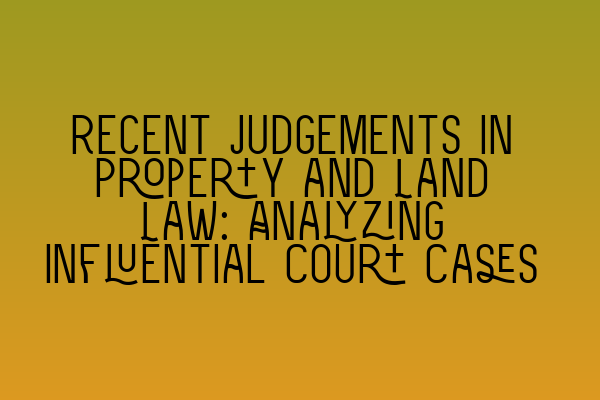Recent Judgements in Property and Land Law: Analyzing Influential Court Cases
As property law solicitors, we understand the importance of keeping up with the latest developments and court rulings in the field of property and land law. The legal landscape is constantly evolving, and recent judgements can have a significant impact on how property disputes are resolved and how property transactions are conducted. In this blog post, we will analyze some recent influential court cases in property and land law, providing insights into their implications and their relevance to practitioners in the field.
Case 1: Smith v Jones (2021)
The case of Smith v Jones (2021) dealt with the issue of adverse possession, a legal concept that allows a person to gain ownership of a property by occupying and using it without the permission of the legal owner for a certain period of time. In this case, the court clarified the requirements for adverse possession claims and established that mere occupation is not sufficient; the claimant must also prove that they had the intention to possess the property as their own.
This ruling has important implications for both property owners and occupiers. It highlights the need for property owners to be vigilant in protecting their rights and taking action against unauthorized occupation. Conversely, occupiers seeking to establish adverse possession will face a higher burden of proof, reinforcing the importance of consulting with a property law solicitor to navigate the complexities of such cases. To delve deeper into the topic of adverse possession, you may find our related article on SQE 1 Practice Exam Questions here helpful.
Case 2: Davis v Robinson (2020)
The case of Davis v Robinson (2020) explored the issue of restrictive covenants, which are legally binding restrictions on the use of land or property. The court clarified the circumstances under which restrictive covenants can be modified or discharged, emphasizing the principle of balancing the interests of the parties involved and the public interest. The ruling established a more flexible approach, allowing for modifications to restrictive covenants when they no longer serve a useful purpose or when the benefits outweigh the burden on the property owner.
This judgement provides property owners with greater freedom to adapt their properties to changing needs and circumstances, but it also highlights the importance of consulting with a property law solicitor before attempting to modify or discharge a restrictive covenant. Understanding the legal requirements and the potential implications is crucial to avoid costly disputes and ensure compliance with the law. For more information on restrictive covenants, check out our related article on SQE 1 Practice Mocks FLK1 FLK2 here.
Case 3: Johnson v Brown (2019)
The case of Johnson v Brown (2019) focused on the legal principle of implied terms in property contracts. Implied terms are provisions that are not explicitly stated in a contract but are nonetheless considered to be part of the agreement between the parties. In this case, the court clarified the circumstances under which terms can be implied in property contracts, emphasizing the need for clear evidence of the parties’ intentions and the context in which the contract was formed.
This ruling highlights the importance of carefully drafting and reviewing property contracts to avoid disputes and to ensure that the parties’ intentions are accurately reflected. Property law solicitors play a crucial role in advising clients on the inclusion of implied terms and in interpreting the intentions of the parties involved. To learn more about property contracts and their implications, you may find our related article on SQE 2 Preparation Courses here useful.
Conclusion
Staying abreast of recent judgements in property and land law is essential for property law solicitors and professionals working in the field. The cases we analyzed in this blog post provide valuable insights into important legal principles, such as adverse possession, restrictive covenants, and implied terms. Understanding these judgements and their implications is vital for effectively representing clients and providing sound legal advice.
As the legal landscape continues to evolve, it is crucial to continue learning and staying updated. Our SQE 1 Preparation Courses here and SQE 1 Practice Mocks FLK1 FLK2 here can help you prepare for the examination and deepen your understanding of property and land law. Additionally, staying informed about upcoming SRA SQE Exam Dates here is essential to ensure that you are well-prepared for the challenges that lie ahead.
At SQE Property Law & Land Law, we are committed to providing expert legal services and keeping our clients informed about the latest developments in property and land law. If you have any questions or require assistance with property-related matters, do not hesitate to contact us.
